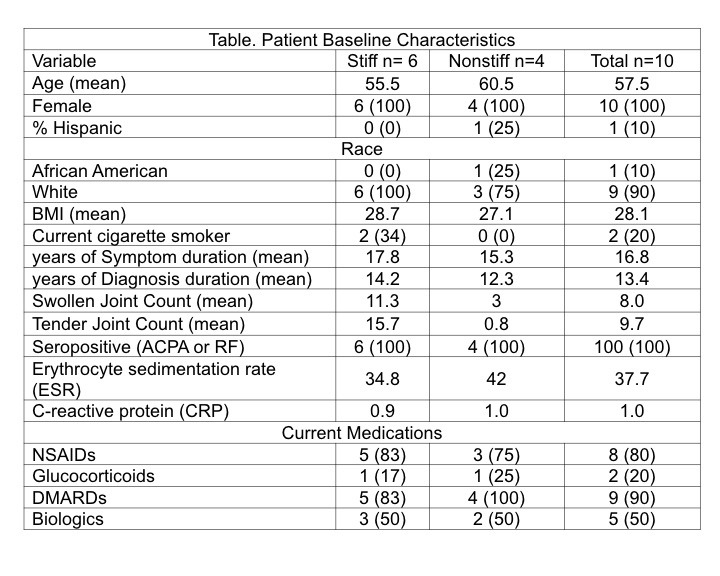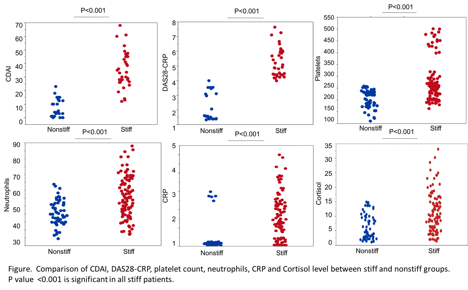Session Information
Session Type: ACR Poster Session C
Session Time: 9:00AM-11:00AM
Background/Purpose:
Rheumatoid arthritis (RA) related morning stiffness is a cause of early retirement and disability. We hypothesized that circadian variation in hormones or immune cells may contribute to this problem. We compared signs and symptoms of stiffness and disease activity, labs, and hand ultrasounds of RA patients with and without morning stiffness.
Methods:
We conducted a prospective feasibility observational study of patients who met ACR2010/EULAR classification criteria for RA and reported stiffness lasting more than one hour or less than 30 minutes. Ten patients were admitted for three days to Rockefeller University hospital. Patients continued standard of care treatment and were matched for steroid use (+/- 2.5mg prednisone equivalent). The RADAI-5 questionnaire was used to assess symptoms every four hours while awake. CBC, ESR, CRP, and serum cortisol were measured every four hours. Disease activity scores, CDAI and DAS28CRP, and ultrasounds were performed at 8AM and 4PM each day. Ultrasound images of wrists and MCPs 2-5 bilaterally (10 joints) were obtained using a Vevo MD standard 10-22MHz linear probe. A musculoskeletal radiologist used the OMERACT semiquantitative scoring (0-3) system to assess both tendons and synovium and these scores were summed.
Results:
The study participants were all seropositive females, with a mean of 57 years of age (Table). Stiffness severity was significantly increased in the morning compared to all other time points in the stiff group (p<0.02). Patients who were stiff had significantly increased tender joint counts, swollen joint counts, patient global assessments of disease activity, CDAI, and DAS28-CRP (all p<0.001) compared to nonstiff patients. Platelets, neutrophils, CRP and serum cortisol were all significantly higher in stiff compared to nonstiff patients (all p<0.001)(Figure). Eosinophils demonstrated significant circadian variation in the stiff group (p<0.02). There was significantly increased synovial greyscale scores between stiff and non-stiff patients (p=0.03), and a nonsignficant trend of increased synovial greyscale summary scores between morning and evening time points.
Conclusion:
We conclude that stiff patients have increased disease activity, blood levels of platelets, neutrophils, CRP, and cortisol, as well as increased morning eosinophils. This work lays groundwork for follow up studies and suggests that morning stiffness may be reflected in increased synovial gray scale.
To cite this abstract in AMA style:
Mikaberidze N, Nwawka O, McNamara MA, Hurley A, Bykerk VP, Orange D. Pilot Study of Characterizing Rheumatoid Arthritis Related Morning Stiffness [abstract]. Arthritis Rheumatol. 2018; 70 (suppl 9). https://acrabstracts.org/abstract/pilot-study-of-characterizing-rheumatoid-arthritis-related-morning-stiffness/. Accessed .« Back to 2018 ACR/ARHP Annual Meeting
ACR Meeting Abstracts - https://acrabstracts.org/abstract/pilot-study-of-characterizing-rheumatoid-arthritis-related-morning-stiffness/


